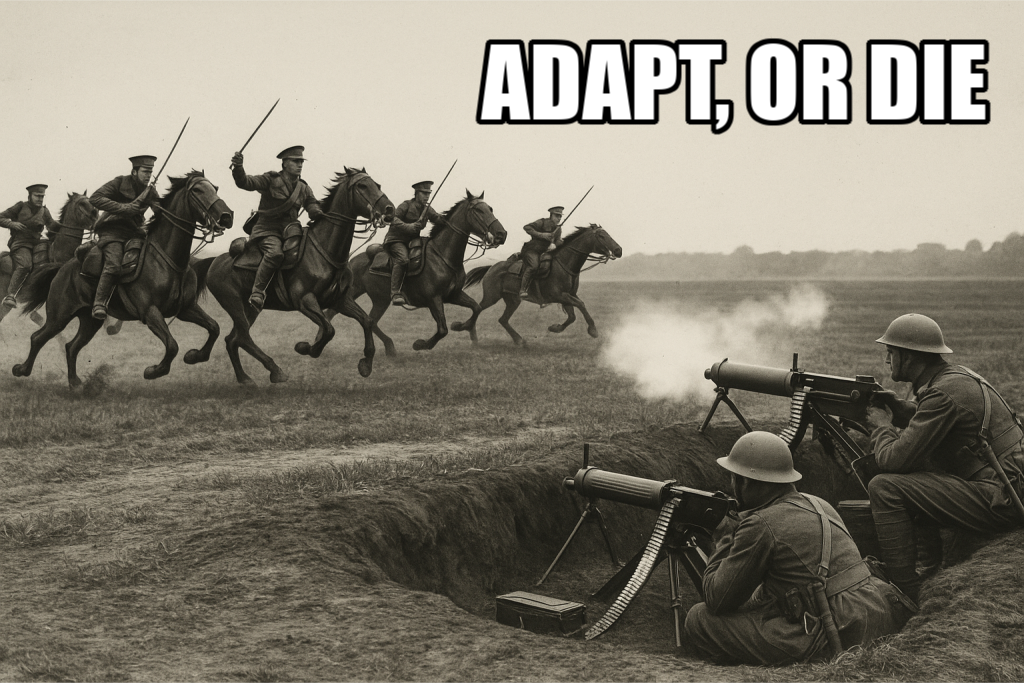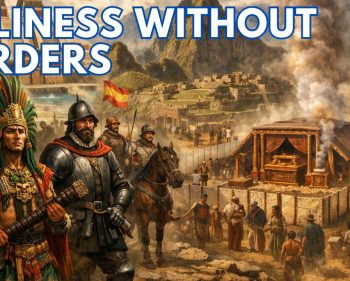ADAPT, OR DIE

There’s an old military joke that generals are always ready to fight the last war. And it’s true. The tactics that once worked brilliantly often turn into recipes for disaster when dragged into the next generation of battle.
Think about mounted cavalry: in previous centuries, horsemen were the terror of the battlefield, the most feared soldiers in the world. But by World War I, cavalry charges against machine guns turned into scenes of absolute slaughter. What had once been cutting-edge became tragically obsolete.
And it didn’t stop there. The infantry scouts of World War II, who risked their lives crawling through bushes and in built up areas to check enemy positions, have been replaced today by drones—tiny, buzzing machines that can scan terrain and send back high-definition video without putting soldiers in harm’s way.
If you don’t innovate, if you don’t adapt to change, you don’t just risk irrelevance—you risk annihilation. Without innovation, there is no present. And without a present, there is certainly no future.
Now, I’ll tell you something personal: I think you know that I have always loved history. I can happily spend hours reading about long-forgotten battles and obscure kings, and listening to podcasts about empires that once ruled the world but have since vanished.
I love standing in historic buildings, trying to imagine the people who lived there centuries ago, making decisions they thought would shape the future forever.
For me, history isn’t just about dusty facts and faded documents—it’s about perspective. History reminds us that the way things are today isn’t how they’ve always been, and it won’t be how they always will be. One day we will also be part of the history books, and how we conduct ourselves will be considered quaint and historic.
That’s why I was so struck by the pasuk in Ha’azinu (Deut. 32:7): זְכֹר יְמוֹת עוֹלָם, בִּינוּ שְׁנוֹת דֹּר וָדֹר; שְׁאַל אָבִיךָ וְיַגֵּדְךָ, זְקֵנֶיךָ וְיֹאמְרוּ לָךְ – “Remember bygone days; understand the years of each generation; ask your father and he will tell you, your grandfather and he will say it over to you”
At first glance, it sounds like something a history buff would say. Remember the past, learn from the generations before you.
But then the Torah seems to repeat itself: “Understand the years of each generation.” Isn’t that just a poetic restatement of “Remember the days of old”? Why say the same thing twice?
The Menachem Zion (by Rav Menachem Mendel Kasher, 1895–1983 — best known for his monumental work Torah Sheleimah) offers an amazing insight: the word “שְׁנוֹת” doesn’t only mean “years.” The word “שְׁנוֹת” also comes from “שונה” — different. So the pasuk means: remember the days of old, but also understand the differences between generations.
And that’s where the real message kicks in. Of course we must remember history and appreciate tradition. But we must also recognize that every generation is different. The challenges that my grandparents faced are not the same challenges my children will face. And we need to hear from them how their experiences differed from their parents and grsandparents.
To fight today’s battles with yesterday’s strategies is as futile as sending cavalry horses against machine guns, or sending 150,000 men to storm Normandy Beach today. The invasion of Normandy battle has been fought, and that war has been won. The next generation needs us to fight their battles in the way that works for them, not re-fight ours.
Which is why Chazal teach us that Eliyahu HaNavi is the one who will come to resolve all unresolved questions in Torah—the famous “תיקו.” Why Eliyahu? Why not Moshe Rabbeinu himself?
Reb Levi Yitzchak of Berditchev explained: because Eliyahu never died. He has lived through every generation, he has seen every challenge, he has understood every difference. Only he, who has been present for each era’s struggles, is capable of paskening for every generation.
The message is clear. Zechor Yemos Olam—remember the past, know where we come from, honor the sacrifices of those who came before us.
But also, Binu Shnos Dor Vador—pay attention to the changes of the present, and understand that our job is to ensure that Judaism remains alive, vibrant, and compelling for our children and grandchildren.
Because if we don’t adapt our embrace of mitzvos, if we don’t show the next generation why Torah matters to them in their world, then they won’t feel the same passion that we or our parents did.
History without adaptation leads to cavalry charges against machine guns. Torah without adaptation leads to children who look elsewhere for meaning.
Our mission is to take the eternal Torah, the eternal mitzvos, and to show how they are eternally relevant—different in application, but identical in essence—for every single generation.
When Reb Yisroel Salanter founded the Mussar movement in the mid-19th century, he met fierce opposition. People accused him of inventing something new, of disturbing the “mesorah.” Once, someone challenged him: “If learning Gemara was good enough for our fathers and grandfathers, why do we need this Mussar business now?”
Reb Yisroel calmly replied: “When our fathers learned Gemara, their entire world was Gemara. The tailor would put down his needle to run to a shiur; the shoemaker would close his shop early to learn. Torah was in the air. But today, the winds of modernity are blowing. The temptations of the street are greater, and the dedication to Torah is weaker. What was enough for them is not enough for us. For our generation, we must build fences of Mussar.”
That was Binu Shnos Dor Vador in action: Reb Yisroel wasn’t reforming Judaism — he was adapting its embrace for a different generation’s challenges.
The Chozeh of Lublin once explained why Hasidut emphasized joy and song, whereas in earlier generations, the great tzaddikim were often more ascetic and withdrawn.
He said: “In earlier generations, Jews were strong in their faith, unshaken by hardship. They could serve God with fasting and self-denial. But in our times, the Jewish people are broken by exile, poverty, and suffering. If we tell them only to fast and mourn, they will fall into despair. So we must lift them with niggun, with joy, with simcha shel mitzvah.”
(Adapted from a Dvar Torah by Rabbi Yissocher Frand)

